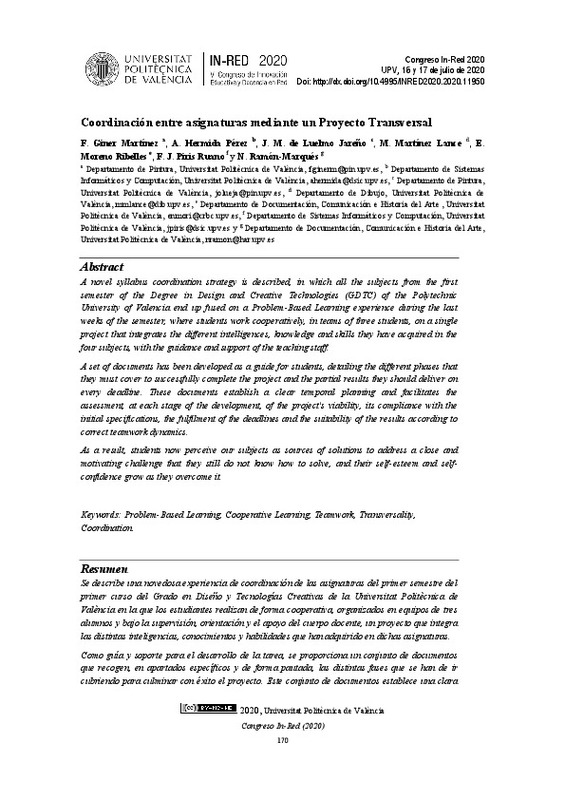|
Resumen:
|
[ES] Se describe una novedosa experiencia de coordinación de las asignaturas del primer semestre del primer curso del Grado en Diseño y Tecnologías Creativas de la Universitat Politècnica de València en la que los estudiantes ...[+]
[ES] Se describe una novedosa experiencia de coordinación de las asignaturas del primer semestre del primer curso del Grado en Diseño y Tecnologías Creativas de la Universitat Politècnica de València en la que los estudiantes realizan de forma cooperativa, organizados en equipos de tres alumnos y bajo la supervisión, orientación y el apoyo del cuerpo docente, un proyecto que integra las distintas inteligencias, conocimientos y habilidades que han adquirido en dichas asignaturas. Como guía y soporte para el desarrollo de la tarea, se proporciona un conjunto de documentos que recogen, en apartados específicos y de forma pautada, las distintas fases que se han de ir cubriendo para culminar con éxito el proyecto. Este conjunto de documentos establece una clara planificación temporal y sirve para que el cuerpo docente pueda valorar, en cada fase del desarrollo, la viabilidad del proyecto, su conformidad con el enunciado inicial, la adecuación a los plazos indicados y la idoneidad de los resultados atendiendo a dinámicas de trabajo en equipo. Gracias a esta herramienta de aprendizaje, los alumnos perciben las distintas asignaturas como fuentes de soluciones prácticas para abordar el reto planteado y su autoestima y autoconfianza crecen al superarlo, al constatar la inmediata aplicabilidad del aprendizaje.
[-]
[EN] A novel syllabus coordination strategy is described, in which all the subjects from the first
semester of the Degree in Design and Creative Technologies (GDTC) of the Polytechnic
University of Valencia end up fused ...[+]
[EN] A novel syllabus coordination strategy is described, in which all the subjects from the first
semester of the Degree in Design and Creative Technologies (GDTC) of the Polytechnic
University of Valencia end up fused on a Problem-Based Learning experience during the last
weeks of the semester, where students work cooperatively, in teams of three students, on a single
project that integrates the different intelligences, knowledge and skills they have acquired in the
four subjects, with the guidance and support of the teaching staff.
A set of documents has been developed as a guide for students, detailing the different phases that
they must cover to successfully complete the project and the partial results they should deliver on
every deadline. These documents establish a clear temporal planning and facilitates the
assessment, at each stage of the development, of the project's viability, its compliance with the
initial specifications, the fulfilment of the deadlines and the suitability of the results according to
correct teamwork dynamics.
As a result, students now perceive our subjects as sources of solutions to address a close and
motivating challenge that they still do not know how to solve, and their self-esteem and selfconfidence grow as they overcome it.
[-]
|









